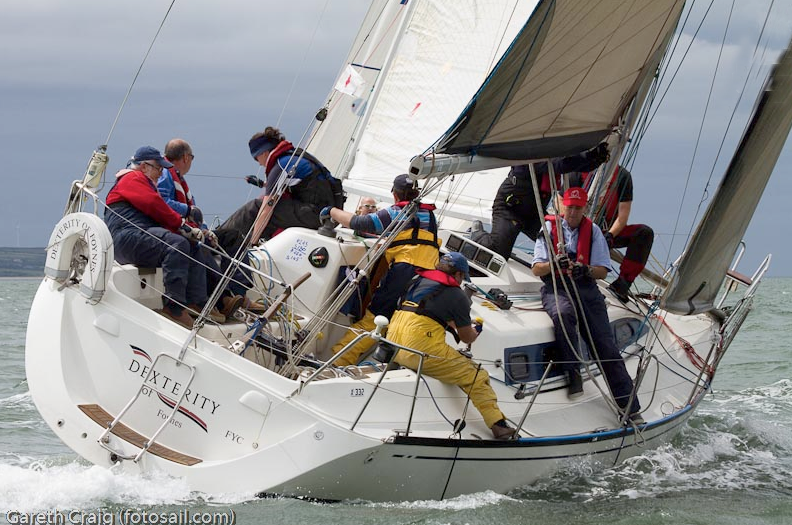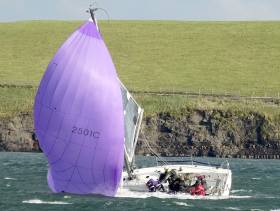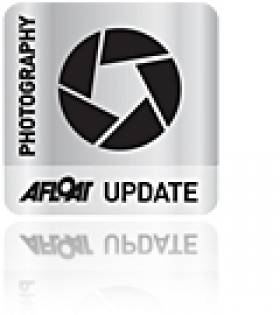Displaying items by tag: Royal Western Yacht Club
Blessing of Boats at Kilrush as Royal Western Yacht Club Season Kicks Off on Shannon Estuary
The Royal Western Yacht Club of Ireland at Kilrush on the Shannon Estuary opened its sailing season with a ‘Splash & Sail’ day of celebration to launch the dinghy sailing fleet and club kayaks.
The event was attended by many members, particularly the junior section eager to try out the brand new fleet of Topper Topaz training dinghies.
Club Treasurer, Monica Roche, welcomed everyone to the occasion and spoke briefly about plans for the coming season.
The event was attended by Clare County Councillors, Gabriel Keating and Ian Lynch, who spoke about his delight to see the legacy of past sailors being continued in Kilrush and complimented the club and especially the junior sailors and wished them well in the coming season.
Fr. Pat Larkin officiated over the Blessing of the Boats with a short service which was also attended by the Kilrush RNLI and he walked through the dinghy park and the marina to bless all the boats.
The club are very grateful for the Government Sports Capital Grant which assisted the club immensely by providing grant funding for six new topaz training dinghies and a Whaly boat, and Clare County Council who assisted with a grant for six new kayaks.
Royal Western Yacht Club has announced a new race to its four-year cycle of oceanic events.
The Round Iceland Yacht Race (RIR) - first edition - will start on Sunday 14th May 2023 from Plymouth Sound National Marine Park. The course, quite simply, is to leave the Eddystone Lighthouse to Starboard, Iceland to Starboard and finish on the Royal Western Yacht Club line.
This Category 1 race will be open to solo, double-handed and fully crewed yachts. Classes will be open to multi and monohulls from 27ft to 65ft. IRC, MOCRA and non-rated yachts may enter, along with Open60’s pre 2014 and Open40’s who will be offered their own class subject to entry numbers.
The Royal Western Yacht Club is very pleased to confirm that, as a partner to the Global Solo Challenge (GSC), the race will act as qualifying miles for the 2023-24 GSC event.
Royal Western Yacht Club Rear Commodore Oceanic, Adrian Gray, said “We are really excited to offer the RIR. The concept came from recent COVID contingency plans and wanting to offer a challenge equal to that of the OSTAR but starting and finishing in Plymouth. Fortunately, COVID has reduced sufficiently for us to run the OSTAR in 2 weeks, but the intrigue and appeal we have seen for this race has encouraged us to offer it as part of our 4-year cycle moving forwards. We are also very pleased to announce the race as a GSC mile builder, particularly as its founder, Marco Nannini, has such a strong history with the RWYC. We hope that the race will feature a number of entrants to the GSC as it is a great comparison to the challenge, they will be taking on later in the year. Whether you are into oceanic racing or simply wanting to experience something unique with the safety factor our races provide and in the company of others, this has to be a future bucket list race!”.
Founder of the Global Solo Challenge, Marco Nannini said “Although we do not require that GSC competitors qualify in a race, we do encourage it. Preparing and planning for an event such as the newly launched Round Iceland Race provides an excellent framework whereby skippers will have a precise goal and will have to face the weather they find rather than be able to plan a passage over a good weather window. Sailing as far north as Iceland will also give them a taste of sailing in cold and damp conditions. We are very pleased about our partnership with the RWYC and with the creation of this race which can become a new classic”.
for further information or to enter please contact [email protected]
O'Donovan's J/24 'Yachtzee' is Royal Western October Series IRC Winner
The Shannon Estuary's RWYCI October Series concluded this weekend on the 30th of October. The series had scheduled races over the first four Sundays and the final Saturday in October.
Racing was cancelled due to bad weather on the first weekend, the series got underway on week two in sunshine and light north-westerly winds of 6-10 knots, under the excellent race management of Aoife Lyons and David Vinnell.
The on-the-water team got in three races in each class with windward-leeward courses for the spinnaker fleet and triangular courses for the white sails fleet.
In the spinnaker fleet, it was Tadhg O'Loingsigh and crew on their J24, Janx Spirit topping the spinnaker fleet in both ECHO and IRC. In white sails the very impressive traditional sailing craft, Sally O'Keeffe, built by Steve Morris and operated by Seol Sionna, won race one, and race three was won by Pat O'Shea's Malo 36, Amergin, however, Elaine O'Mahoney & Simon McGibney's newly acquired First 265 lead the class after week one with a 2nd – 1st – 2nd.
 Series organiser Simon McGibney (left) with Diarmuid O'Donovan's J/24 Yachtzee crew, the IRC winners of the Royal Western Yacht Club October Series
Series organiser Simon McGibney (left) with Diarmuid O'Donovan's J/24 Yachtzee crew, the IRC winners of the Royal Western Yacht Club October Series
On the third Sunday of racing, OOD's Aoife Lyons and David Vinnell, ran two races in beautiful sunshine with a southerly 10-12 knots. In the spinnaker fleet Janx Spirit continued their great form with a further two wins in IRC while Rob Allen's Corby 25 lead the spinnaker fleet in ECHO. In white sails, Adrian O'Connell on his modified Seawolf 26 claimed two wins to put pressure on the leaders.
With another weekend cancelled due to weather, the final weekend of racing took place on the last Saturday of the month, in this enjoyable series. There was plenty of wind from the south-west and luckily the rain held off during the mid-afternoons racing. White sails completed their full schedule of races with another two races, both won by Fintan Keating's Halberg Rassy, Passade, who enjoyed the heavier winds. The spinnaker fleet added three more races to their series with two wins for the Corby 25, Smile and a race win for Ray McGibney's J24, Lady J in ECHO and two wins for Diarmuid O'Donovan's J/24 Yachtzee, with Smile taking the final race win in IRC.
At the overall prize-giving event on Saturday evening event organiser, Simon McGibney thanked all the volunteers especially the OOD's David and Aoife for superb racecourses and efficient running of races each week.
Overall results:
- Spinnaker IRC: 1st Yachtzee, 2nd Janx Spirit, 3rd Smile
- Spinnaker ECHO: 1st Smile, 2nd Yachtzee, 3rd Janx Spirit
- White Sails: 1st Lucita, 2nd Sally O'Keeffe, 3rd Amergin
Full results here
The third and fourth keelboat races of the Royal Western Yacht Club October Series were sailed yesterday in some fresh conditions on the Shannon Estuary at Kilrush creek Marina.
Photo gallery by Kim Roberts below.
New Group Wants To Reclaim Irish Sailing For The Republic
The recently-formed maritime association SOAR (Sailors Of A Republic), which claims to have a nationwide membership, today outlines its plans to reclaim the yacht and sailing clubs of Ireland into a truly republican spirit.
“In view of the successful and generally peaceful nature of the Easter Rising celebrations this week,” a spokesman told Afloat.ie, “we feel the opportunity has been provided to reveal how we will give Irish sailing organisations a completely new image in keeping with the re-born spirit of the times.”
“We would point out” the spokesman continued, “that when the Water Club of the Harbour of Cork was founded in 1720, despite the connections to English royals of some of the founding members, there was none of this royalty nonsense in the title of the new club. And it cannot be claimed that there was no precedent for such a thing. Several scientists – who were to include Robert Boyle of Cork – had got together to found the Society for Improving Natural Knowledge in November 1660, and it very quickly was given the title of the Royal Society.”
“Yet even through its quieter years on Cork Harbour in the late 1700s, the pioneering group of sailors in Cork was always proud to be known simply as the Water Club. It was only many years after the last of the original founders had died that the club contemplated re-titling itself, and it was in the beginning of the era of new yacht club formations in the early 1800s that it allowed itself to become the Royal Cork Yacht Club”.
“At its most simple” the SOAR spokesman said, “what we are seeking is a re-branding exercise. But we are mindful of the recent public annoyance caused by the re-branding of Eircom as Eir, which cost something in the region of €16 million. Thus our special SOAR Nomenclature Sub-Committee has been looking at ways of minimising the cost of a changeover, particularly as it could mean Ireland’s royal yacht clubs would feel they are being discriminated against.”
“Their boat owners would understandably have a special grievance if badly thought-out recommendations put them to extra expense in changing the initials of their club on the transoms of their boats.
But fortunately the words “royal” and “republic” both begin with the letter “R”. So with some foresight, the only expense would be in the detail of club letterheads, in-house notices and so forth, which we fell the truly republican-minded sailors of Ireland will be happy to bear as a group”.
“In order to ensure there is no unnecessary change in the lettering of club initials on boats, our Committee have decided that the Royal Irish Yacht Club will become the Republic of Ireland Yacht Club, or alternatively the Real Ireland Yacht Club. As for the Royal St George Yacht Club, it will become the Republican St George YC. And a real flash of imagination is being shown towards the pioneering spirit of south coast sailing - the Royal Cork Yacht Club will in future be known as the Rebel County Yacht Club”.
However, it is understood that there will be one exception to the proposed name changes. Another source has revealed to Afloat.ie that the Royal Western Yacht Club of Ireland in Kilrush will be allowed to keep its current title. “We are of the opinion that County Clare’s links with Brian Boru provide a royal connection to a real Irish king, a connection which long pre-dates any foreign incursions. We are entirely in favour of keeping the royal titles if we can find a link to our own royalty, and in Brian Boru country, that is easily done.”
WIORA 2010 Regatta Photos from Kilrush here!
On the gallery are the latest images from Gareth Craig of Fotosail from the West of Ireland Offshore Racing Association (WIORA) Championships being sailed on the Shannon Estuary. Click HERE to go the gallery.
































































